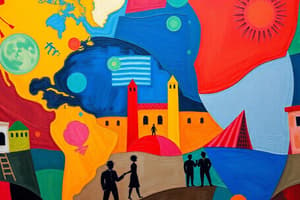Podcast
Questions and Answers
Which period in history is characterized by the rise of empires and the invention of the wheel?
Which period in history is characterized by the rise of empires and the invention of the wheel?
- Prehistoric Era
- Middle Ages
- Ancient History (correct)
- Early Modern Period
What social change was notably present during the Middle Ages?
What social change was notably present during the Middle Ages?
- Feudal system (correct)
- Industrial Revolution
- Civil Rights movement
- Scientific Revolution
Which major event occurred during the Early Modern Period?
Which major event occurred during the Early Modern Period?
- The rise of kingdoms
- The Black Death
- The Renaissance (correct)
- The Crusades
What is a primary source in historical research?
What is a primary source in historical research?
Which famous leader was associated with the Indian independence movement?
Which famous leader was associated with the Indian independence movement?
What significant conflict occurred in Modern History?
What significant conflict occurred in Modern History?
Which theme in history focuses on governance and power dynamics?
Which theme in history focuses on governance and power dynamics?
What does historiography study in the field of history?
What does historiography study in the field of history?
Flashcards are hidden until you start studying
Study Notes
Overview of History
- Definition: Study of past events, societies, and civilizations.
- Importance: Helps understand human behavior, societal changes, and informs future decisions.
Key Periods in History
-
Prehistoric Era:
- Time before written records.
- Relies on archaeology and anthropology.
-
Ancient History (c. 3000 BCE - 500 CE):
- Development of writing systems.
- Significant civilizations: Mesopotamia, Ancient Egypt, Indus Valley, Ancient China, Greece, and Rome.
- Major events: The rise of empires, invention of the wheel, religious formations.
-
Middle Ages (c. 500 - 1500 CE):
- Feudal system, rise of kingdoms, and the spread of Islam.
- Cultural developments: Gothic architecture, scholasticism.
- Events: The Crusades, Black Death, and the Fall of Constantinople.
-
Early Modern Period (c. 1500 - 1800 CE):
- Renaissance, Reformation, and Enlightenment movements.
- Age of Exploration and colonial expansion.
- Scientific Revolution and the rise of nation-states.
-
Modern History (c. 1800 - Present):
- Industrial Revolution and its impact on society.
- Major conflicts: World War I, World War II, and the Cold War.
- Social movements: Civil Rights, feminism, decolonization.
Historical Methods
- Primary Sources: Original documents, artifacts, diaries, and photographs.
- Secondary Sources: Analyses, interpretations, and summaries of primary sources.
- Historiography: Study of how history is written and interpreted over time.
Major Themes in History
- Cultural Development: Art, religion, philosophy, and technology.
- Political Structures: Governance, power dynamics, revolutions.
- Economic Systems: Trade, industry, labor patterns.
- Social Change: Class structures, gender roles, and human rights movements.
Notable Figures in History
- Julius Caesar: Military leader and dictator in Roman history.
- Cleopatra: Last active ruler of the Ptolemaic Kingdom of Egypt.
- Mahatma Gandhi: Leader of the Indian independence movement.
- Winston Churchill: British Prime Minister during WWII.
History's Impact on Today
- Understanding historical context is essential for current politics, cultural dynamics, and social issues.
- Lessons from history inform conflict resolution, governance, and international relations.
Overview of History
- The study of past events, societies, and civilizations.
- Helps us understand human behavior, societal changes, and informs future decisions.
Key Periods in History
- Prehistoric Era: Time before written records, explored through archaeology and anthropology
- Ancient History: (c. 3000 BCE - 500 CE):
- Development of writing systems
- Significant civilizations: Mesopotamia, Ancient Egypt, Indus Valley, Ancient China, Greece, and Rome.
- Major events: The rise of empires, invention of the wheel, religious formations.
- Middle Ages: (c. 500 - 1500 CE):
- Feudal system, rise of kingdoms, and the spread of Islam.
- Cultural developments: Gothic architecture, scholasticism.
- Events: The Crusades, Black Death, and the Fall of Constantinople.
- Early Modern Period: (c. 1500 - 1800 CE):
- Renaissance, Reformation, and Enlightenment movements.
- Age of Exploration and colonial expansion.
- Scientific Revolution and the rise of nation-states.
- Modern History: (c. 1800 - Present):
- Industrial Revolution and its impact on society.
- Major conflicts: World War I, World War II, and the Cold War.
- Social movements: Civil Rights, feminism, decolonization.
Historical Methods
- Primary Sources: Original documents, artifacts, diaries, and photographs.
- Secondary Sources: Analyses, interpretations, and summaries of primary sources.
- Historiography: Study of how history is written and interpreted over time.
Major Themes in History
- Cultural Development: Art, religion, philosophy, and technology.
- Political Structures: Governance, power dynamics, revolutions.
- Economic Systems: Trade, industry, labor patterns.
- Social Change: Class structures, gender roles, and human rights movements.
Notable Figures in History
- Julius Caesar: Military leader and dictator in Roman history.
- Cleopatra: Last active ruler of the Ptolemaic Kingdom of Egypt.
- Mahatma Gandhi: Leader of the Indian independence movement.
- Winston Churchill: British Prime Minister during WWII.
History's Impact on Today
- Understanding historical context is essential for current politics, cultural dynamics, and social issues.
- Lessons from history inform conflict resolution, governance, and international relations.
Studying That Suits You
Use AI to generate personalized quizzes and flashcards to suit your learning preferences.




